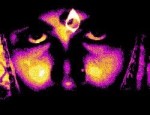Film Review
Sapphire & Steel, one of
the most innovative and challenging television drama series of the late
1970s, early 1980s, ended not with a bang but with a barely audible
whimper. Held over after the transmission of
Assignment Five in 1981, the
last four episodes that make up
Assignment
Six were broadcast by ITV in the scheduler's graveyard of late
August in 1982, almost as if the network was ashamed to claim ownership
of it. The newly formed Central Independent Television company,
the successor to ATV, had no interest in continuing the series and so
it became one of the casualties of the switchover. The fact that
its stars, Joanna Lumley and David McCallum, had had enough and were
unwilling to make any more episodes made the series' demise inevitable.
Scripted by the show's creator P.J. Hammond,
Assignment Six is the least
intelligible of Sapphire and Steel's adventures but it is nonetheless a
compelling mystery serial, eerily atmosperic and containing some of the
most chilling moments in the entire series. Sapphire's sudden
realisation that she and Steel are facing imminent destruction is a
dramatic highpoint that lends an aura of expectant dread to what
follows, and at no time before have they appeared to be up against so
sinister and powerful an opponent as the ones they now face, the three
scarily Pinteresque Transient Beings. Christopher Fairbank's
Johnny Jack could not have been creepier if he had been played by Jack
Nicholson, and Edward de Souza's unnamed character (The Man) genuinely
does look like a fugitive from the 1940s.
As ever, the performances, direction and camerawork are of an
exceptional calibre, and even if the plot makes no sense whatsoever
(surely there are far less convoluted ways of disposing of unwanted
Time Operators than this?)
Assignment
Six is gripping stuff from the first second to the last.
Despite it's brevity, it's a more than adequate swansong for
television's weirdest investigative duo. For four years,
Sapphire & Steel had
television audiences puzzled and perplexed with one mysterious exploit
after another, but the greatest mystery of all is how ITV could let
such a brilliant series die.
© James Travers 2014
The above content is owned by frenchfilms.org and must not be copied.
Film Synopsis
Sapphire and Steel arrive at a seemingly deserted service station in
the early 1980s, a place where time appears to be standing still.
The only people they meet are an eloping couple who at first refuse to
talk to them but are revealed to have been transported here from
1948. They are joined by their associate Silver, who is as
ignorant as they are as to the nature of their present
assignment. At the back of the service station they glimpse a
ghostly image of an old man from the 1920s and then time suddenly
advances by twenty minutes. The appearance of an eccentric
tambourine player from the 1950s convinces the time-investigating trio
that something sinister is afoot and Sapphire soon realises that they
are in mortal danger. Sure enough, the strange people they have
encountered are not humans, but Transient Beings acting for a higher
authority, their purpose: the destruction of Sapphire and Steel!
© James Travers
The above content is owned by frenchfilms.org and must not be copied.
![Abstract picture representing Sapphire and Steel: Assignment Six [TV] (1982)](/img/sapphire-and-steel-assignment-six-tv-1982.jpg)


